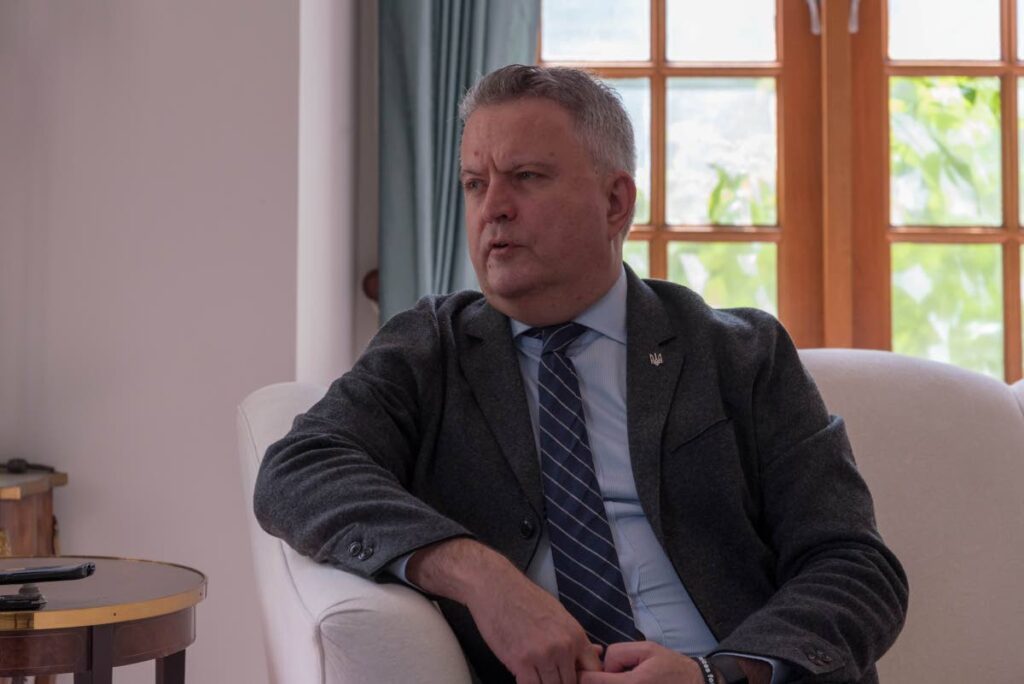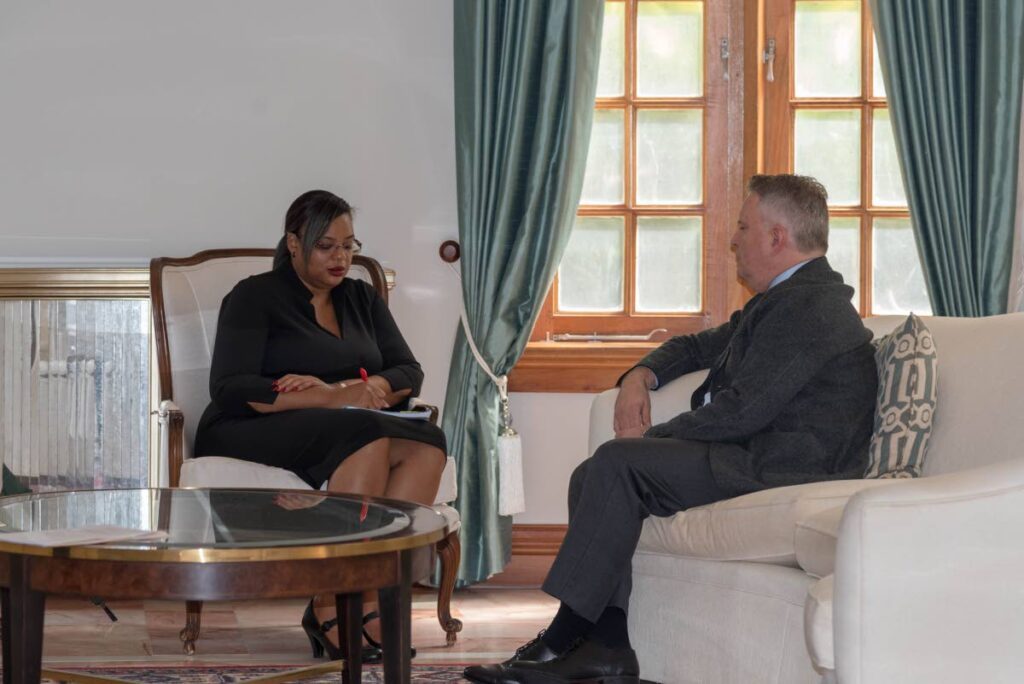War in Ukraine not a video game, says ambassador

Sergiy Kyslytsya, non-resident Ambassador of Ukraine to TT, says it is immoral to reduce the war in his country to entertainment, comment on it as if there were simple solutions, or express boredom or fatigue over the deaths of his people as well as Russian soldiers.
“I don’t appreciate comments coming from certain members of the public or experts who look at this war as if it is a computer game or as if it is a Hollywood or Netflix series. Then they sit on their sofas, eating popcorn, watching news and become kind of bored.
"But it is so immoral to the people being killed every day. They have to realise that it is not a computer game and there is no joystick that you can use to buy extra lives. Those are real lives of innocent Ukrainian civilians that are being hit almost every night with Russian missiles.”
He said there had been comments about removing the “threat” of bringing Ukraine into the North Atlantic Treaty Organization (NATO) and negotiating with Russia on its claims to Ukraine’s eastern border in order to resolve the conflict peacefully.
But Kyslytsya, who is also the permanent representative of Ukraine to the UN and non-resident Ambassador of Ukraine to The Bahamas, said there was no way the European community would change its position on bringing Ukraine into the European Union (EU) or NATO.
Speaking with Sunday Newsday at the residence of the delegate of the European Union to TT in Cascade, St Ann's, he said Ukraine now had the status of candidate country with the EU and believed the formal membership negotiations would begin by the end of the year.
Also, at NATO’s Vilnius Summit in July, there was a declaration to allow Ukraine regular consultations with NATO countries and to continue providing non-lethal assistance to Ukraine.
He said while it was a principled decision Ukraine would become a member of NATO, there was a limited chance that would happen while the war was ongoing.
“I think when the military phase of this war is over, the process of succession of Ukraine to NATO will be accelerated. And I think that we are at the point where both sides understand that Ukraine needs NATO and NATO equally needs Ukraine.
“Ukraine has proved, in the course of the last 600-plus days, that we are capable to defend the security of Europe, because when we fight this aggression, it's not the aggression just to defend ourselves. It is the aggression to defend the entire European continent (as Russia threatens other European countries every so often).”
He added that it was important that the EU continues to be a very strong partner with TT, as the more advanced the dialogue, the more chances there were to develop political and economic trade and co-operation between the countries.
Kyslytsya said it was clear that everyone wanted the war to end and some people were trying to plant the idea of fatigue with the Russia-Ukraine war.
Asked if the talk of fatigue could affect the US Senate hearing on Tuesday where the White House is expected to argue for US$105 billion in emergency aid for Israel and Ukraine, he expressed confidence in continued international support.
He said responsible members of both political parties in the US understood supporting Ukraine was a secondary issue.
“What they do support is world order based on international law and standards, based on the need to respect international borders, based on the need to respect sovereignty. That's what they support.
“And of course, there are members of governments in many countries who would like to see the resolution sooner rather than later. But responsible members of the parliaments and of the governments, not those populists who feed the public with political fast food, understand that today's warfare is not the warfare of the 17th or 18th century. Today's warfare is all about technology.”

At the 11th emergency special session of the UN’s General Assembly on February 23, a new resolution was adopted, again demanding that Russia withdraw its military forces from Ukraine and stop hostilities, noting the war’s impact on food security, energy, finance, the environment and nuclear security and safety.
He said if there were people in Russia ready to discuss the end of the war based on the resolution, there would be a different conversation. But he said, one did not hear “sober voices” out of Moscow, but propaganda and hatred.
In theory, he said there was a chance of sustained peace if there was a change in the political regime.
Speaking on the most recent conflict between Israel and Palestine, he pointed out that Ukraine was one of the countries that voted for the proposed two-state solution decades ago.
He condemned the “terrorist attacks” by Hamas and compared it to what happened in Ukraine, where families were killed over their nationality. He also expressed regret that the amendment to formally condemn Hamas was not passed by the UN General Assembly in October in Canada, but was glad it was made clear that international humanitarian law should be respected and aid delivered to Gaza.
“There are no simple solutions. Will TT agree that your neighbour will take half of Trinidad or all of Tobago and then they will wage war against you? And then they will plant this narrative that everybody in Caricom is so tired of this conflict? How about you just give up on Tobago or part of Trinidad? What would you say? World affairs and global affairs, they do not work based on the most simple emotions.”
UKRAINE AND TT
Kyslytsya congratulated TT on its permanent representative to the UN in New York, Dennis Francis, being elected president of the UN General Assembly. He described Francis as “ very skilful” and a friend.
“He has so many issues in front of him. And the way the president steers those discussions in the most representative body in this world, the General Assembly, certainly he will have a very powerful impact on world affairs.”
He said during his visit to TT he made an official visit to President Christine Kangaloo and met with several resident ambassadors in TT, and was encouraged by what he heard.
“I think it's also important for me to receive the first-hand information about the priorities of your government, be it international affairs, the national economic agenda or trade agenda. I also meet fellow ambassadors from European countries, from Latin America, because I see quite a vibrant diplomatic life in Port of Spain.”
He praised TT’s principled position in supporting the UN Charter saying TT had a clear record of voting against its violation when it comes to borders and sovereignty.
“I think that position is very important, not only for my country, but also for the region. This region is very fragile. I'm not going to name a country, but the potential for territorial disputes through this region is quite high.
“And I think it is in the intrinsic interests of every democratic government to make it absolutely clear that all international disputes or conflicts should be settled by peaceful means, not by violation of the UN Charter, not by invading foreign territories.”
He said TT and Ukraine offered each other mutual support and believed they had to stick together to maintain international peace and security.
Kyslytsya added that TT had natural resources, citizens with high levels of education and many other advantages that, if used and developed correctly, could put it in the forefront of development in the region. But he said TT needed access to a high level of technology and that was something Ukraine could provide.
“Your future is not in the patterns or protocols or know-hows of the past century. Your future is with the know-how that only highly advanced countries can offer you. Because sometimes, even if the money is available, it's not about the money. It's about how you can do something to leap into the future.”
He said Ukraine could offer its experience with electronic platforms, as most of Ukraine’s government processes were online, including taxes and pension applications. Even driver’s licences were electronic and deeds and other information could be easily accessed in an electronic registry.
Such systems, he said, would be positive for countries comprising multiple islands as, among other benefits, there would be no need to travel long distances.
“That will have a multiplying effect on local business, on national business, on trade opportunities. It’s incredible.”
He said Ukraine also had experience and would be willing to share its expertise on tele-medicine, transparent government procurement and online education. He said with so many people being displaced by the war, many children were continuing their Ukrainian education online while abroad.
Kyslytsya stressed that if there were more opportunities in TT, there might be less brain drain in the future and more citizens may eventually return with experience and contacts, and possibly start small and medium businesses which would diversify TT’s economy.


Comments
"War in Ukraine not a video game, says ambassador"